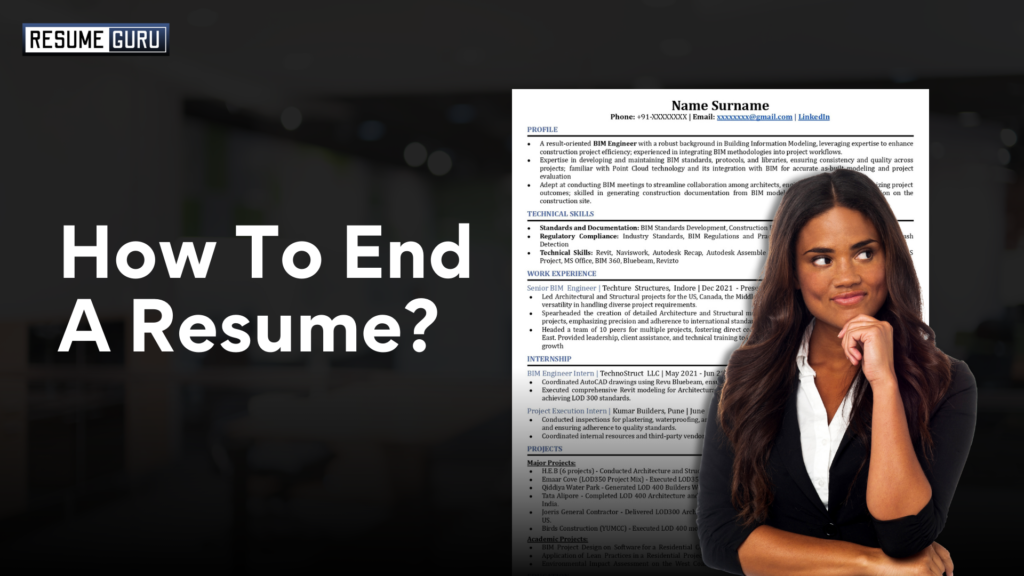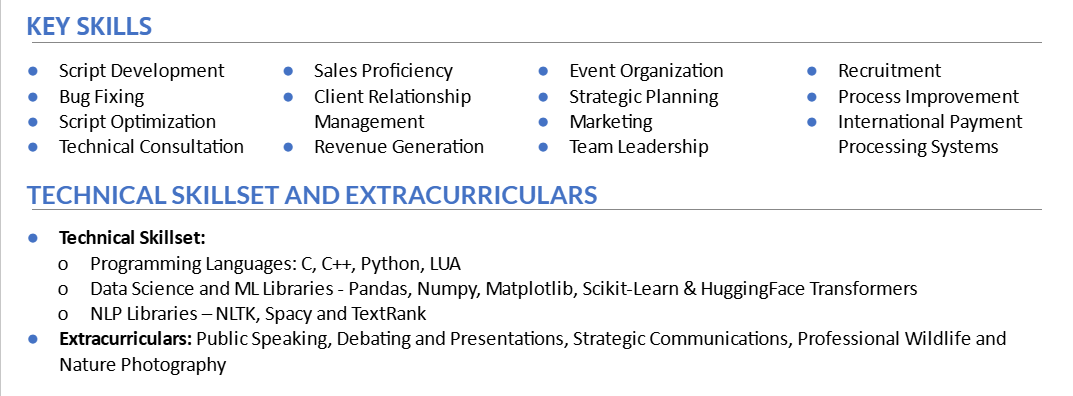5 Proven Strategies for How to End a Resume Like a Pro

Imagine watching a movie that leaves you with an ambiguous, unresolved ending.
Now, picture your resume ending in a similarly unclear way. A weak or ambiguous ending on your resume can leave employers questioning your qualifications and readiness, much like an unresolved movie ending leaves viewers unsatisfied.
In this guide, we’ll show you how to end a resume with clarity and impact, ensuring that the final impression you leave is both memorable and decisive.
Why the Ending of Your Resume Matters?
First, let’s clarify one thing: your resume doesn’t need a formal “conclusion” like an essay.

Instead, the ending should serve as a quick wrap-up that reassures employers that you’re ready and available.
Often, a resume ends with a concrete section such as a skills summary, which is easy for recruiters to scan. Alternatively, it might include additional sections like languages, projects, or volunteering activities. Some people even choose to highlight an achievements section at the end, or simply reiterate their education.
Understanding how to end a resume effectively is key, as the goal is to provide important yet impressive information that reinforces your skills and qualifications, making recruiters feel confident that you are the right fit for the role.
5 Proven Strategies for How to End a Resume
While there’s no fixed rule for how to end a resume, the goal is to maintain a strong impression from start to finish. Ending your resume effectively means reinforcing your qualifications and ensuring recruiters can quickly see your value. Here are 5 proven strategies for how to end a resume:
1. Summarize Your Skills
Concluding your resume with a concise skills summary is a powerful way to remind recruiters of your core competencies. By listing technical skills and soft skills that are relevant to the job, you not only reinforce your qualifications but also optimize your resume for Applicant Tracking Systems (ATS).

2. Personal/Others Section
Another effective approach is to include a section that covers additional personal details, such as projects, languages, interests, hobbies, volunteering experiences, or certifications. Although these details may not be directly related to the job, they add depth to your profile and help create a well-rounded image of who you are.

3. Achievements Section
Ending your resume with an achievements section can make a memorable impact by highlighting your successes. In this part, you can list awards, recognitions, or significant milestones that underscore your ability to deliver results.

4. Education Section
For many professionals, especially those with extensive work experience, placing the education section at the end is a strategic choice. When your professional experience takes center stage, listing your educational background at the end provides the necessary context without overshadowing your work history.

5. Contact Information & Optional References
In some regions, particularly in international or Middle Eastern applications, you might also need to include additional details like your driving license, nationality, or passport information.
Additionally, you can choose to add “References available upon request” if it aligns with industry standards—this is still relevant in fields such as teaching.

Common Mistakes When Ending a Resume
Here are some common mistakes to avoid when ending your resume, along with explanations for why they can hurt your final impression:
1. Including a Declaration at the End:
Adding a declaration like “I hereby declare that the above information is true to the best of my knowledge” is considered outdated and redundant. Employers already assume the information you provide is accurate. This unnecessary statement consumes valuable space that could be used to highlight more relevant skills or experiences.
2. Adding Excessive Personal Information:
Including details such as your full home address, your father’s or mother’s name, or other unrelated personal data is generally not recommended. Such information can lead to potential bias and does not add value to your professional profile.
3. Inconsistent Style:
A resume with mismatched fonts, varied formatting, or uneven spacing gives the impression of carelessness and lack of attention to detail. Maintaining a consistent style throughout your resume, including the ending section, ensures a polished and professional appearance that makes it easier for recruiters to focus on your content.
4. Failing to Tailor the Ending to the Job:
A generic ending may not resonate with every employer. Customize your final sections (such as skills, achievements, or additional information) to align with the specific requirements of the job you’re applying for. Tailoring your content shows that you understand the role and have taken the time to make your resume as relevant as possible.
For additional assistance in writing a resume, check out these helpful articles
How to Write a Summary in Resume for Freshers
Conclusion
In conclusion, knowing how to end a resume effectively is crucial for leaving a strong final impression on recruiters. Whether you choose to summarize your skills, highlight your achievements, or simply reiterate your contact information, each element should reinforce your overall profile and professionalism. Avoid common pitfalls like including outdated declarations or irrelevant personal details, and always ensure your resume maintains a consistent style tailored to the job you are applying for.
FAQ’s
Do I need to include a formal “conclusion” paragraph at the end of my resume?
No, a formal conclusion isn’t necessary. Instead, focus on wrapping up your resume with key sections like skills, achievements, or additional information that reinforces your qualifications.
What should I include in the final section of my resume?
The ending of your resume can include a summary of your skills, an achievements section, additional personal information (such as languages or certifications), and even your contact details. The goal is to leave a clear and impactful final impression.
Is it acceptable to add references or a statement like “References available upon request” at the end?
Yes, you can add “References available upon request” if it’s common practice in your industry. However, listing actual references is generally not recommended unless explicitly requested by the employer.
Should I repeat my contact information at the end of my resume?
Reiterating your contact information at the end can be beneficial. It ensures that hiring managers have easy access to your details, regardless of where they are in the document.
5. How can I tailor the ending of my resume for a specific job?
Customize the final section by emphasizing skills, achievements, or certifications that align with the job requirements. This targeted approach shows that you understand the role and highlights the qualifications that make you the best fit, demonstrating how to end a resume with precision and relevance.
Related Articles
Recent Posts
Recent Posts
- 0xd148a913
- How We Helped a Planning Engineer Get More Interview Calls with Our Resume Writing Services
- Helped a US-Based Fresher Create Role-Specific Resumes
- Dubai-Based Client Lands Interviews with Our Resume Writing Services
- 100+ Computer Networks Interview Questions
- 70+ Interview Questions for Pharma Industry : Documentation Executive
- 100+ Business Development Inteview Questions
- 100+ Salesforce QA Inteview Questions
- 80+ Real Estate Inteview Questions
- 100+ Supply Chain Management Inteview Questions
Facing constant rejections? Your Resume could be the reason.
You’re losing opportunities every single day because your Resume isn’t up to the mark.
Get a Free Resume Review and a report from our expert.
- Insightful Resume Review
- Given by an Expert Resume Writer
- Detailed PDF with Report and Guidance
